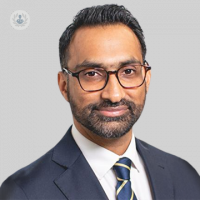Polycystic ovarian syndrome: consequences of a raised testosterone level
Written in association with:Polycystic ovarian syndrome (PCOS) affects how a woman’s ovaries work and can impact on her capacity to have children. In this article, leading consultant physician and endocrinologist, Dr Umasuthan Srirangalingam, explains what PCOS is, how PCOS symptoms can be managed, and why it is important for women with PCOS to consider lifestyle factors to improve symptoms and reduce the risk of heart disease.

What is polycystic ovarian syndrome?
Polycystic ovarian syndrome results from an imbalance in hormones in women, in which the level of testosterone runs high. It is entirely normal for women to have low levels of testosterone (male hormone) in the body, but when this level increases more than usual, this contributes to the development of PCOS.
The reasons why women develop PCOS are complex and include both genetic and lifestyle factors. Interestingly, PCOS has some similarities with diabetes, although here sugar levels tend to remain normal. The body appears to be resistant to the effects of insulin, the hormone which controls sugar levels, and this imbalance can lead to the common signs and symptoms of PCOS. This similarity can be important when we think about treatments for PCOS.
Is polycystic ovarian syndrome a serious condition?
It is estimated that one in ten women are affected by PCOS, so it’s very common. Whilst it is not a life-threatening condition, symptoms can vary quite considerably, and some women can be severely affected. Fortunately, there are a number of treatments which are effective in managing the condition.
What are the signs and symptoms of polycystic ovarian syndrome?
PCOS is associated with three main features. Firstly, periods can be irregular or they may actually stop. Secondly, women might experience symptoms as a result of higher testosterone levels, including excess hair growth on the face or other parts of the body, scalp hair loss and an increased risk of acne. The third sign is that ovaries tend to contain lots of cysts (polycystic).
Are there different types of polycystic ovarian syndrome?
Whilst there are three main features of PCOS, it is important to remember that women may not experience all of them. In fact, only two features out of three are needed to make a diagnosis. There are a number of other health issues linked to PCOS. One is fertility, which can be an issue if periods are irregular. The other one is that women can be at increased risk of developing what we call ‘the metabolic syndrome’, which causes weight gain, raised cholesterol, high blood pressure and a future risk of developing diabetes. These factors can increase the risk for heart disease and stroke later in life if they are not controlled.
How do you confirm a polycystic ovarian syndrome diagnosis?
PCOS is very common, but there are a number of other diagnoses which can present in similar ways but need different treatments. If you suspect PCOS, it is important to see an endocrinologist to confirm the diagnosis. In my case, I would initially talk through your symptoms, confirm what your concerns are, and then undertake an examination to look for signs of PCOS. We would need to have a blood test and potentially an ultrasound scan of your ovaries. The blood test would rule out other diagnoses and confirm PCOS.
What are the treatments for polycystic ovarian syndrome?
PCOS can affect every woman in a different way, and thus treatment needs to be tailored to the individual’s need. In my case, I always discuss lifestyle interventions and non-medicinal ways of managing PCOS.
Medical treatments can be divided into three different strategies. Firstly, I consider medicines used in diabetes management, which can also work well in PCOS. This includes some of the newer diabetes medication that can be very effective with helping weight reduction, such as the GLP1 analogues, for example, liraglutide and semaglutide. Secondly, I consider medication which can lower or block the effects of testosterone and finally, I think about treatments to reduce unwanted hair growth or improve scalp hair growth.
Some of these treatments can help regulate the menstrual cycle and improve fertility, but additional treatments may also be needed.
How can a person with polycystic ovarian syndrome manage their symptoms?
Lifestyle modification through healthy eating, exercise and watching changes in weight, are critical to reducing the impact of hormonal imbalance and managing PCOS symptoms successfully. Medical treatments can be very effective at managing PCOS, but women may also need to continue to use physical methods to remove unwanted hair in the interim. It is also important look out for, and treat, risk factors for heart disease in the longer term. For example, through stopping smoking and getting a regular check of your blood pressure, cholesterol and blood sugars.
Dr Umasuthan Srirangalingam is a highly experienced consultant physician in diabetes and endocrinology based in London, who specialises in the treatment of adrenal and thyroid disorders, diabetes, male fertility and PCOS. If you would like an expert diagnosis of polycystic ovarian syndrome, and wish to know more about the condition, make sure to visit Dr Srirangalingam's Top Doctors profile today.


